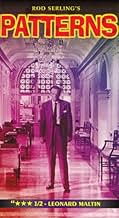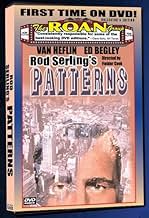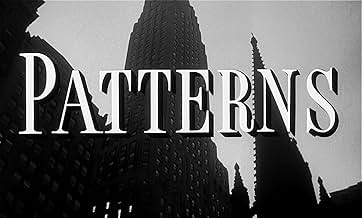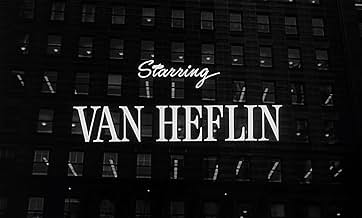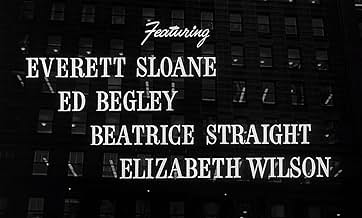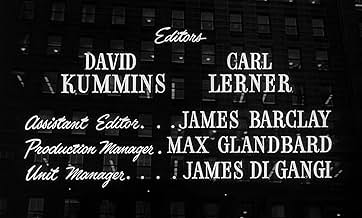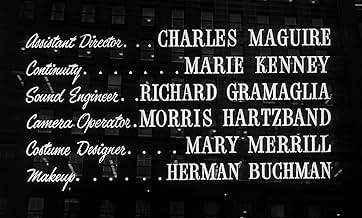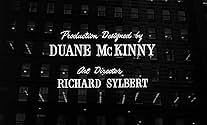When Fred Staples is recruited onto the board of a high-powered New York corporation, he finds his ethics and ambition at odds.When Fred Staples is recruited onto the board of a high-powered New York corporation, he finds his ethics and ambition at odds.When Fred Staples is recruited onto the board of a high-powered New York corporation, he finds his ethics and ambition at odds.
- Nominated for 1 BAFTA Award
- 1 nomination total
- D.J. Vandeventer
- (as Jack Livesy)
Featured reviews
What Heflin doesn't realize is that he's the object of a corporate power play. Sloane is hard driving, ruthless executive usually in the kind of role Ed Begley plays. For once Ed Begley is a nice guy in a film. He's a decent soul unlike Sloane, but he's past his best years. Sloane doesn't want to fire him, just demean him enough so he'll quit. Begley's loyalties to the company stem from when Sloane's father ran the business and he can't see life beyond it.
All this comes out at the first board meeting that Heflin attends and later at a party that he and wife Beatrice Straight throw for the board members. Heflin is a confused man, caught between liking and admiring Begley and sadly knowing his future lies with Sloane.
A number of films were made in these years about corporate connivings at the top. Patterns can hold its own with any of them and that list would include Executive Suite, The Power And The Prize, Cash McCall, and B.F.'s Daughter in which Van Heflin co-starred with Barbara Stanwyck.
Patterns was originally a television drama and one of the best early scripts done by Rod Serling. Begley and Sloane repeated their roles, movie name Heflin was substituted for Richard Kiley. The filming still betrays its photographed teleplay origins, but the players more than compensate for the deficiencies there.
For a good look at how we saw corporate America in the Eisenhower years you can't do much better than Patterns or any of the other films I mentioned.
Except for a brief use of subjective camera, director Cook films in a straightforward manner, letting the strong story carry events. I like the way he sets up the world of big business in the opening shots-- the cathedrals of capital towering over Wall Street pedestrians, the church bells signaling the sanctity of the mission, the subtle pecking-order among the secretaries based on who their boss is. It all smacks of industrious efficiency, revealed later on, however, as a very ruthless efficiency. The upwards shot of Heflin standing in the over-arched hallway tells us right away he's a man big enough to compete in this demanding environment.
Heflin is great as the small-town success suddenly promoted to the big city headquarters. Trouble is he's also brought a down-home sense of ethics, which handicaps his ability to survive the bloody board meetings presided over by CEO Everitt Sloane, aptly described as a human "barracuda". Unlike the other characters, Sloane's Walter Ramsey comes perilously close to a one-note caricature in his cold-hearted drive, salvaged only by a single-minded respect for competency and a desire to encourage full business potential. It's this latter that makes an otherwise implausible ending somewhat believable-- (I'd still like to know if the movie's compromised ending was Serling's original intent).
The cast is outstanding for their skill rather than for their looks, no small development in the glamor-obsessed 50's. Ed Begley's Bill Briggs makes for a tragic figure, an affecting left-over from the world of small business where an owner could address every employee by name. He and small town Heflin hit it off immediately, thereby heightening Heflin's predicament, the film's dramatic centerpiece. That post-war decade didn't provide many big roles for middle-age or plain-looking women. Both Wilson and Straight show how much the talent pool extended beyond the bosomy young things. Watch Wilson pause over the little potted plant that adorns her desk as she quits her job. Should she take it or not. Of course she takes it, because she's loyal not only to the needy Briggs, but to a tiny thing that would otherwise not survive the intense environment. It's a slight character touch like this that makes a movie stand out from the rest.
The key scene in the library is well handled. There, Heflin's wife (Straight) demonstrates her own wifely ambition, routed in typical 50's fashion through the success of her husband. When he hesitates, she insists on grabbing the brass ring, thereby forcing him to face his own suppressed ambition within the Darwinian world of corporate executives. As a result, I'm not sure I buy her sudden willingness at the end to "start over" away from the big house and fancy car. In fact, as good as the script is, there are a number of softening concessions to both people and plot.
Note Sloane's rationale for laying off employees in a distant plant-- By increasing efficiency through layoff, he asserts, new opportunities will eventually open up that will improve everyone's lot down the line. Some such version amounts to textbook theory and no doubt is sometimes true. But I wonder how true it is for millions of laid-off Americans whose good jobs have now been shipped overseas, and whose prospects now don't extend much beyond the local Mac Donald's. How true is it for them. No doubt, in Sloane's book, I'm indulging in rank sentiment and not the hard-headed principles that make capitalism continue to expand (but perhaps, not "grow"). That's the movie's crux and one that continues to press 50 years later. Patterns presents a somewhat hopeful 50's look at the big corporation; I'm not sure that a 21st century view would be quite so hopeful.
Van Heflin, who plays the lead role as Fred Staples, is an actor who I never appreciated until late in my movie viewing life. Shame on me. I can't explain this other than the fact that I didn't see either "3:10 to Yuma" or "Act of Violence" until well into middle age, and I can thank Turner Classic Movies for finally introducing me to these films, to Van Heflin, and to much, much more than that. Heflin is a very natural, often understated professional. When I see him in a movie, his portrayals appear very real to me, as if he isn't reading the lines of a script written by someone else but rather speaking his own words very credibly and seamlessly. I think that this is what excellent acting is all about. Ed Begley, Sr. also appears in one of the best roles of his career, if not the very best, as Bill Briggs, the corporate executive who is being replaced by Staples and who is humiliated and degraded as a human being during the ugly process. Everett Sloan is perfectly cast as Mr. Ramsey, the egotistical, ruthless CEO who brutally intimidates any subordinate who stands in the way of his corporate goals and vision. Elizabeth Wilson, as the loyal secretary awkwardly transferred from Briggs, her beloved, longtime boss, to Staples, the new darling on the block, and Beatrice Straight, as Staples' sympathetic, sensible wife, both provide outstanding support.
I also liked how the director, Fielder Cook, created the fast pace of the corporation, at least at the height of its activity during normal business hours. I'm sorry that I missed Richard Kiley as Staples in the original play written for television. He is an actor who successfully played a wide range of characters from the very naive, inexperienced teacher in "Blackboard Jungle", to the crime-busting lawyer in "The Phenix City Story", and finally to the charismatic Don Quixote in the musical "Man of La Mancha".
The nightmarish view from the straining eyes of a stricken Biggs as his colleagues helplessly peer over him is very distressful. I recognize Mr. Serling's very distinctive influence here at a very critical moment in the film. Beyond this movie, the writer was among the most brilliant and creative contributors to the much missed "golden age of television".
Everett Sloane, Ed Begley and Van Heflin really provide the viewers with an acting tour de force. Sloane as the big boss Walter Ramsey, creates a strutting despotic character that is as memorable as it is harsh, here's a man who will not "pattern" a sacking of an employee, he would rather break him into resignation!, a totally vile and cruel "pattern" tactic. Begley (superbly playing weary emotion) plays the genial and honest William Briggs, who upon welcoming Van Heflin's Fred Staples to the company, realises it's likely to be at his own cost. This giving the film a deep emotional "pattern" as Staples (Heflin to me, donning a career high) gets conflicted about his role in this company, this leads us to a truly excellent finale as Heflin and Sloane go at each other with a gripping intensity that many modern actors could do no worse than to take note of, it really is something to behold.
A fabulous movie that comes highly recommended to anyone who appreciates dialogue driven films with intelligence pouring from every frame. 9/10
Did you know
- TriviaA rare film for the era in that it does not have a musical score.
- GoofsThe dialog in the final scenes, starting with Staples' conversation with his wife in a coffee shop near his office, indicate the events take place well into the evening. However, the exterior shot linking this scene with Staples' confrontation with Ramsey in the Ramsey & Company building, as well as the exterior shot that follows the confrontation, were both taken in broad daylight.
- Quotes
Bill Briggs: On our level you don't get fired, you know that. After thirty years of productive work, they can't say to a man like me, "Alright, now get out!" They just can't do that. So what do they do? They create a situation. A situation you can't work in and finally that you can't live in with this tension, abuse. Small humiliations. It all starts out on a scale so subtle, so microscopic that at first you can't really believe it's happening at all. But gradually the thing begins to take shape. The pieces fit together - all the little bits. And it becomes unmistakable. They chip away at your pride, your security until you begin to have doubts, and then fears.
- ConnectionsReferenced in American Masters: Rod Serling: Submitted for Your Approval (1995)
- How long is Patterns?Powered by Alexa
Details
- Release date
- Country of origin
- Official sites
- Language
- Also known as
- Patterns
- Filming locations
- Pine Street and Nassau Street, Manhattan, New York City, New York, USA(Nancy drops off Fred on his first day at work)
- Production companies
- See more company credits at IMDbPro
- Runtime
- 1h 23m(83 min)
- Color
- Sound mix


